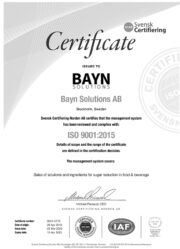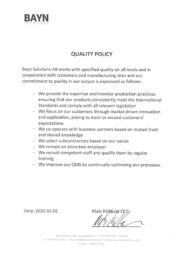We help food and beverage companies to reduce sugar while maintaining the same good taste and mouthfeel, and the important functions. We do this with sweetened fibres. These are dietary fibres onto which we attach sweeteners from a natural source. The result is an ingredient that replaces sugar, in solid or liquid form, 1:1. This means that you can simply replace 1 kilo of sugar in your recipe with 1 kilo of sweetened fibres in solid form. Taste, mouthfeel and important functions remain the same. The same goes for 1 litre of sugar in liquid form, it can be replaced by 1 litre of sweetened fibres in liquid form. Easy!
We have developed sweetened fibres for a whole range of applications, and we sell these B2B, both in large and small quantities, under the name EUREBA®.
We use ingredients from natural sources (e.g. chicory root and stevia).
Contact us if you want to try EUREBA®.
Vision
Sugar tastes great. Yes, we think so too. But this taste comes at a high price. Too high, in our opinion. We’re not talking pounds and pennies, even if they too play a role, but the price many people pay with their health.
Sugar has no positive effect on your health. The brain does require glucose, but the body can take care of this by breaking down the carbohydrates found naturally in your food. Too much sugar can have a negative effect on your health; it increases the risk of overweight, obesity and tooth cavities.
Overweight and obesity are known risk factors for, among other issues, diabetes, high blood pressure, high levels of cholesterol, triglycerides, and other blood fats, as well as for cardiac and vascular diseases. Obesity also increases the risk for certain cancers.
The World Health Organization (WHO) strongly recommends that the amount of added sugar of all kinds, (glucose, fructose, saccharose etc.) and sugar from honey, sugar syrup, fruit juice and concentrated fruit juice, should contribute less than 10 percent of an individual’s entire daily energy intake. This corresponds to about 50-75 grams of sugar a day, depending on your energy needs.
Other national and international organisations have come to the same conclusions. As an example, the Nordic countries have also agreed on that all kinds of added sugars should contribute less than 10 percent of the energy from your food.
The problem is that most people eat more sugar than what is recommended. The main source being sugar added in foods, in the form of regular sugar, glucose syrup and similar products. This is why public health would benefit if the food and beverage industry industry would make a greater effort in reducing sugar. This is something we want to contribute to.
Our team has in-depth knowledge and long experience of sugar reduction in the food and beverage industry. We can help most companies with this. Our vision is to be the preferred partner in the industry when it comes to solutions for sugar reduction.
Mission
Sugar is added to food and drinks to give sweetness, taste and aroma. But it is also added to provide volume and texture, and in some cases to increase shelf life, lower the freezing point, or it can be added for other functional properties. So you can’t just remove the sugar and replace it with a sweetener.
Our solution to this challenge is to replace the sugar with sweetened fibres. These are dietary fibres on which we have attached sweeteners. That the sweeteners are attached to the fibres is important. This makes it possible to use the sweetened fibres, which may be in solid or liquid form, just as if they were sugar or syrup.
The particular fibres and sweeteners we use depend on the application. Dairy products need other fibres and sweeteners than beverages, which in turn needs different ones to bakery products and so on.
We develop sweetened fibres for a range of application areas. All with natural fibres and sweeteners from a natural source (e.g. chicory root and stevia). Then we find the best suppliers for these raw materials and produce sweetened fibres that we sell to food and beverage producers who want to reduce sugar in their products. That’s is what we do.
Our mission is to deliver market leading solutions which enable the manufacturing of healthier foods which thereby creates revenue and increased value for our customers, stakeholders and interested parties.
Research and development
Bayn Studio is our innovation centre in Gävle. This is where we run cooperation projects, hold seminars, and help small and medium sized companies with sensory profiling and formulation expertise for sugar reduction. But most of all we do research and development to develop sweetened fibres, which we market under the name EUREBA®.
At Bayn Studio we analyse the sensory effect of sugar and its functional properties in different foods and beverages. It may be a specific product in which sugar needs to be replaced with a tailor-made solution, or for an application such as chocolate, ice cream, confectionery, ketchup, sweet drinks, protein bars, desserts and sauces.
Our team in Gävle also studies the properties of different dietary fibres and sweeteners. The purpose is to understand which sweeteners should be attached to which fibres, and in which proportions, to get the exact properties needed to replace sugar or syrup 1:1 in that specific product or application.
First and foremost we develop sweetened fibres at our innovation centre. It may sound simple: to choose the sweetener and make it stick to a dietary fibre with the right properties. Of course it is far more complex than this. It takes extensive technical know-how and a long practical experience to develop sweetened fibres that tick all the boxes. Some of the most important requirements are that
- no calories are added, or that they are at least significantly reduced compared to the sugar which is to be replaced
- the glycemic index is low or non-existent
- it is possible to replace sugar 1:1 without having to alter the production process
- sweetness, aroma, taste, texture and aftertaste is affected as little as possible
- the desired functional properties are maintained (e.g. volume, weight, heating properties)
- the required demands are fulfilled (e.g. sugar free, natural, rich in fibre, free from allergens, vegan, halal, kosher)
- all regulatory requirements are met
- high quality raw material is available as regards both volume and price.
In short: It is at Bayn Studio that we design sweetened fibres that don’t just remove what is unhealthy, but that add what is healthy.
Quality and environment
Producers of food and beverage are in a trust position. Consumers trust them with their health and well-being. A producer who falls back on this trust, whether accidentally or for their own gain, has a long way to go before the trust is reestablished, it may even be impossible.
This is why the success of food and beverage producers depends on their suppliers’ will and ability to deliver ingredients of good quality. You might say that food and beverage producers give suppliers the most important thing they have – the trust their customers have in them.
As a supplier of solutions to sugar reduction we take this trust very seriously. Bayn Solutions works relentlessly to maintain high quality and to constantly improve ourselves and our products.
To us quality is much more than just demands met. It is about understanding the needs and expectations of our customers, and to use this understanding to constantly improve our ability to meet these needs and expectations.
These are our most important quality guidelines:
- Code of Conduct: The Code of Conduct is based on the UN Global Compact and the compact’s ten principle in the areas of human rights, labour legislation, the environment and anticorruption, the ILO’s fundamental conventions on human rights at work, the Rio Declaration on Environment and Development, and the UN conventions against corruption, as well as laws and agreements.
- Performance: Our products have detailed specifications. It goes without saying that we fulfill these to one hundred percent. You can trust us to deliver on our promises.
- Safety: We do not compromise when it comes to food safety and hygiene. We put high demands on our suppliers as concerns raw materials and manufacturing capacity. And we follow-up these demands regularly. You can safely assume that our products meet international standards and follow all the relevant regulations.
- Natural: We use natural raw materials, or raw materials from a natural source. The difference in these terms lies in the degree of processing. Both kinds of ingredients come from nature. But the term natural means that the product is allowed to go through little or no processing (e.g. peeled, sliced, grated). If the process is more comprehensive (e.g. through refining) you are only allowed to say that the raw material comes from a natural source. No matter which, you can trust us not to use artificial ingredients in our products.
- Environment: We choose suppliers who consider the environment in their cultivation, harvest and processing of our raw materials. We consider carbon footprints when we select transport from raw material producers to manufacturers. And we place demands on our manufacturing partners to consider the environment. We understand that environmental considerations are important to you and your company, and most of all to your company’s customers.
- Fairness: we have fair deals with our co-workers and suppliers. We demand fair deals for the staff of our suppliers and their subcontractors and for them to set the same demands in turn. This way we can guarantee that our products are produced under fair conditions.
- Dependability: Our sweetened fibres replace sugar 1:1 in recipes. This means that you can use them in an existing manufacturing process in the same way as you would when using sugar, in solid or liquid form.
- Delivery: We do our utmost to secure delivery. We understand that your production stands and falls with the right delivery at the right time.
- Service: We’re not just any supplier. We are a cooperation partner who will do everything in our power to help you and your company to succeed.
- Price: We know that the margins may be small in the food and beverage industry and that every penny counts. We do what we can to keep the costs down for your company. The possibility to replace sugar 1:1 without changing the basic formulation or modifying the manufacturing process is one way. Of course we are also keeping the cost of raw material, manufacturing, transport, and administration down. But we will not sacrifice other quality dimensions for a low price. When it comes to quality, you get what you pay for.
As regards quality, we fulfill the demands for the international quality management system – ISO 9001. You can view our certificate here, and our quality policy here.



